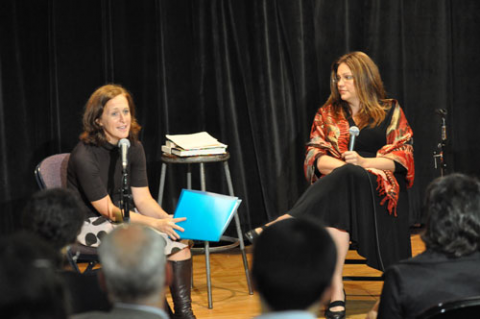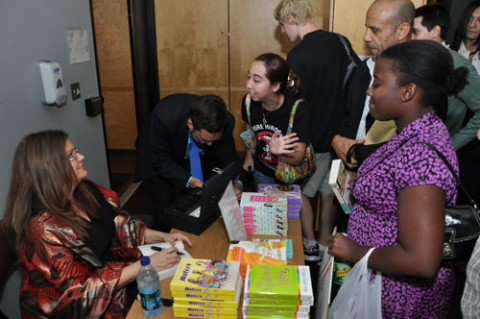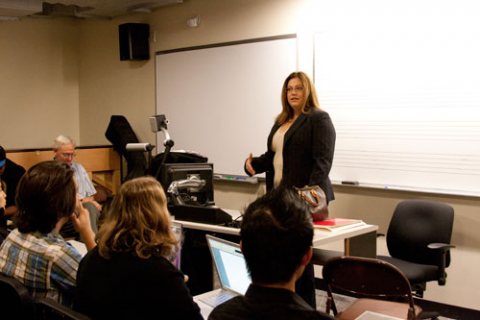Alumna Alisa Valdes-Rodriguez Comes Full Circle

Alumna Alisa Valdes-Rodriguez candidly talks about her trajectory from musician to journalist to novelist.
Photo by Phil Farnsworth

Associate professor Julie Rold leads a question-and-answer session with Valdes-Rodriguez.
Photo by Phil Farnsworth

Valdes-Rodriguez signs copies of her novels.
Photo by Phil Farnsworth

Valdes-Rodriguez visits liberal arts professor Peter Gardner's Fiction and Film class during her Berklee visit. Throughout the week, she visited several classes.
Photo by Jennifer Shanley
Reading from a work-in-progress, New York Times best-selling novelist and two-time Pulitzer Prize–winning journalist Alisa Valdes-Rodriguez '92 channels Charles Dickens's A Tale of Two Cities, replacing Paris and London with Miami and Havana, and the backdrop of the French Revolution with the Cuban Revolution. She evoked a kind of call-and-response with the English writer, an homage to a literary great. "Baby, I can't do it better but I sure can sing along," she read from her introduction while at Berklee in late September, a visit organized by the Liberal Arts Department.
The musical allusion is no surprise. For the musician-turned-writer, the intersection between music and words has never been lost. In fact, it was Valdes-Rodriguez's experience at Berklee that motivated her to embark on a writing career, first as a journalist. Frustrated with what she perceived as a gender bias, she aired her concerns in a 1992 Boston Globe article, prompting the college to take a critical look at itself.
It's a tale that came full-circle in an unexpected way for Valdes-Rodriguez when Berklee president Roger H. Brown invited her back to campus, giving her the opportunity to see the strides the college has made. When Valdes-Rodriguez graduated, the student population was 15.5 percent female; today, it's 29 percent.
Meanwhile, in her fiction she has taken on topics near and dear to her, such as identity, justice, and equality. In her first book, The Dirty Girls Social Club, Valdes-Rodriguez said she was trying to show there's no "one-size-fits-all homogenous Latino identity. . . . In my second book [Playing with Boys], I wanted to show political diversity among the Latino world."
The world has taken note. Time magazine named her among the 25 most-influential Hispanics in the United States. Hispanic Business Magazine has twice named her among the 100 Most Influential Hispanics in America.
She visited several liberal arts classes, sharing her trajectory from playing saxophone to penning novels (The Dirty Girls Social Club is slated for a television series, and her seventh novel, The Three Kings: A Christmas Dating Story, was just released); participated in a question-and-answer forum with Berklee's FUSION magazine fiction editor and liberal arts associate professor Julie Rold; and sat down with berklee.edu for an interview.
Students were impressed with Valdes-Rodriguez's courage and conviction. "As someone of mixed background I thought it was powerful to see a woman not afraid to express her opinion and say, 'The world is prejudiced,'" said April Buscher, a fifth-semester piano principal and music therapy major whose mother is part Japanese and father part Spanish. "She's such a strong woman. She really empowered herself and that's encouraging to see."
Buscher said she saw parallels between Valdes-Rodriguez's writing career and the music industry, and saw her message as emboldening to Berklee women as they set out to make their mark. "The music industry is geared more towards men. It's great to be able to see a woman be successful, to be a writer and not conform to stereotypes."
The following are excerpts from Valdes-Rodriguez's interviews during her visit.
With Rold:
How does a saxophone principal from Berklee become a New York Times–bestselling novelist?
It was always hard for me to separate music from writing in my mind and my heart because to me, they're very much the same thing. I learned language and I use language in more of an auditory way than in a visual way. It was always a question in the back of my mind about which I'd end up doing. I wrote my first short story at 9, got my first saxophone at 9 so those two things were always developing side by side for me. . . . One of my happiest moments at Berklee was during a party at my apartment. Kurt Rosenwinkel ['90], a friend, was there and he went into my room and started looking at my notebooks. I remember him sitting cross-legged on the floor, and for the rest of the party Kurt and I just sat in my room and he read my poems and told me how great they were. He and I played together as students. He was supportive of my playing but I never got a reaction from playing as I did from writing. It was sort of a turning point for me and I thought, maybe I'm better at this thing. Music was harder. Music was more work. I felt everyone could write because it was so fun and easy for me, it surely couldn't have been anything special at all. . . I think a part of growing up is coming to terms with the gifts the universe or God gave you instead of the ones that you want.
Talk about the parallels between your music and your writing, how the words sound on the page.
One of the early criticisms that my writing got was that my sentences were too short and choppy. I'm instinctively incapable of writing really long sentences. As a wind player, you can't really improvise a really long phrase because you have to stop and take a break. . . I very rarely write a sentence that takes more than one breath to speak.
How do you use comedy to get your messages across?
Jerry Seinfeld said it best: Comedy is nothing more than socialized rage. And I really believe that. You can get the same points across by making people laugh that you can by lecturing them. . . . When you can make a prejudiced person laugh at themselves and their own prejudice, you've gotten through and you can get in there and you can eviscerate them but as long as they're laughing, you're safe. Humor is a shield for me but it's also a way to express a lot of frustration and rage, in a weird way.
With berklee.edu:
What do you think of liberal arts as an added component to a music education?
I love it. When I was a student here I belonged to a poetry group at a women's center in Cambridge. I joined that to try to have a writers' support group, and now the school has a poetry club. When I heard that, I thought, that would have been so awesome. I love that these kinds of links are being made between different art forms and Berklee's really in a leadership position to do that.
And I really am grateful that I was invited back as an alum because it would be easy to just focus on musical successes. I love that Roger Brown is putting a spotlight on people who have done well with a music education in something other than music, that it's not a failure. . . because we're all doing it in some capacity in the other things that we do, so it's useful.
What does a music education give you as a life skill?
I record my own audiobooks. For the first book, after I recorded the first chapter the producer came in and said, "I've never seen anything like that." I said, "What do you mean?" And she said, "You did it in one take. We have professional actors who usually do this and it takes them a lot of takes. They'll stumble on words, and have to go back. How did you read however many words without stopping or making a mistake?" I thought about it and realized it was because it was on a music stand it was obvious to me that I was reading words the way I had been trained to read music, which is you're a few notes ahead of where you're playing so you don't make the mistakes because you know what's coming. So that kind of mental process, of thinking ahead of where your mouth is or where your fingers are, that's a musical skill that came in really handy.
Also, just doing public readings, being a performance major—having been educated in techniques of presenting yourself on a stage and interacting with an audience and being engaging has been helpful, and not a lot of authors necessarily have that training. Many of them who are phenomenally brilliant will put you right to sleep at their readings.
That creative part is right there in less concrete ways. In improvisation or composition, you're telling a story. There's a beginning, a middle, and an end. Things have to build and resolve. Fiction is exactly the same. Storytelling has that same arc. There's the tension building, and the musical tension is in the intervals between notes and it has to resolve.
What are your impressions of any changes or evolution here in terms of gender bias you felt you experienced when you were here?
The number of female students has increased; it's double now what it was then. I just spoke to the director of female recruitment. She said the next class coming in is even higher. That's amazing, and that there even exists a position of female recruitment [director] is phenomenal. My presence here, the difference in how I'm treated now as compared to how I was treated at the time, is night and day. . . . The institution itself has done so much.
Because I wrote that [Boston Globe] piece right as I was about to graduate, I pretty much just left and moved on, and wasn't aware of any changes taking place. So I've been very moved. It's been very emotional for me.
What advice would you give to women musicians, women writers?
I've been able to think about what it takes to make it and to have longevity in a career, and it isn't always the most talented person or the one who plays the most. It's the one who keeps trying and doesn't stop after being rejected. But when you're putting your composition out there or you're playing, or your story, and people reject it, it's devastating. It can be devastating. You've got to remind yourself that there is an audience for you. A rejection just means that that's not the audience for you and keep going.
You mention that some of your characters have a soundtrack, that you associate them with albums or songs. What song or album is defining this moment in time for you?
The new Eminem album [Recovery]. He's somebody I feel a kinship with on a couple of levels. He's a musician and a writer and as far as rappers go, rhythmically, he's really sophisticated. And from a lyrical standpoint, even though he's cursing a lot and I can't listen to the album in front of my son, he's going through personal growth openly and admitting to mistakes and admitting to all sorts of ugly things—the kinds of things I write about too—domestic violence and unhealthy love.




